Fix the Rota, Fix the Store:
UK Retail Colleagues Signal Poor Scheduling Leaves Shoppers Underserved, Staff Overstretched, and Sales Lost
New Logile Survey shows that while most UK retail staff receive rotas in advance, last-minute changes, understaffing at peak times and overstaffing in quiet periods are eroding service, straining teams and driving lost revenue.

Retailers across the UK are working hard to do more with less. Rising labour costs, ongoing margin pressure and heightened customer expectations mean every scheduled hour counts. Many operators are investing in new systems and practices to optimise staffing, but translating labour plans into consistent execution on the shop floor remains a persistent challenge. The question is no longer whether to plan, but how to make those plans work reliably in practice.
This challenge comes at a time when the conversation about work in the UK is shifting. New government proposals on zero-hours contracts, short-notice shift changes and stronger sick-pay protections are raising expectations for fair and predictable scheduling. Meanwhile, the wider economic backdrop—soft consumer confidence, uneven sales volumes, and continued cost headwinds—intensifies the need to allocate labour precisely, protecting both service and efficiency. In this climate, getting rota execution right has become a commercial and reputational imperative.
To better understand the scale of the challenge—and what it means for UK retailers—Logile conducted a survey of 500 frontline store colleagues across the UK in July 2025. The research set out to explore how well labour planning is translating into day-to-day executions on the shop floor.
The findings of the Logile 2025 UK Labour Planning & Optimisation Report, reveal a frontline workforce caught between advance planning and real-world volatility. Staff report unpredictable rotas, short-staffing at peak times, over-staffing in quieter periods and frequent last-minute changes, all of which undermine service and efficiency.
Taken together, the results highlight the pressing need for a smarter, more flexible approach to labour opitmisation—one that connect forecasting, scheduling and real-time execution so rotas work as intended, not just on paper.
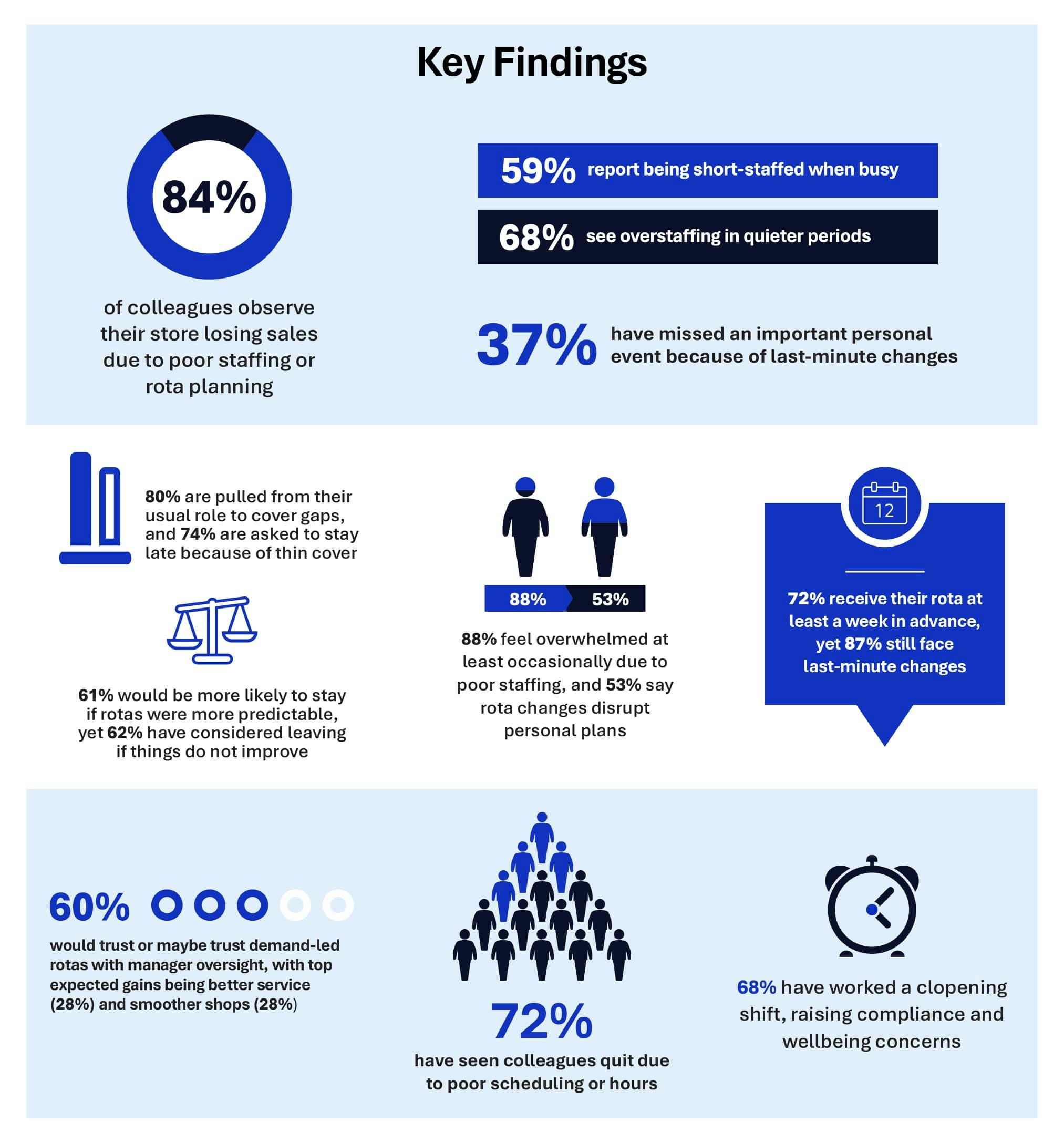
Coverage Misses Demand Both Ways
UK retail colleagues point to a simple but costly reality: coverage rarely matches customer demand. Stores are often short-staffed at the busiest times, then overstaffed when traffic slows. The result is a double hit—lost sales on the one hand and wasted payroll on the other.
The survey findings bring this imbalance into sharp focus. 59% of colleagues say their shop is short-staffed when busy, leaving customers without timely support. At the same time, 68% report over-staffing during quiet periods, with hours being paid for but not effectively used. Colleagues see the commercial impact clearly: 84% believe these planning gaps cost their store sales.
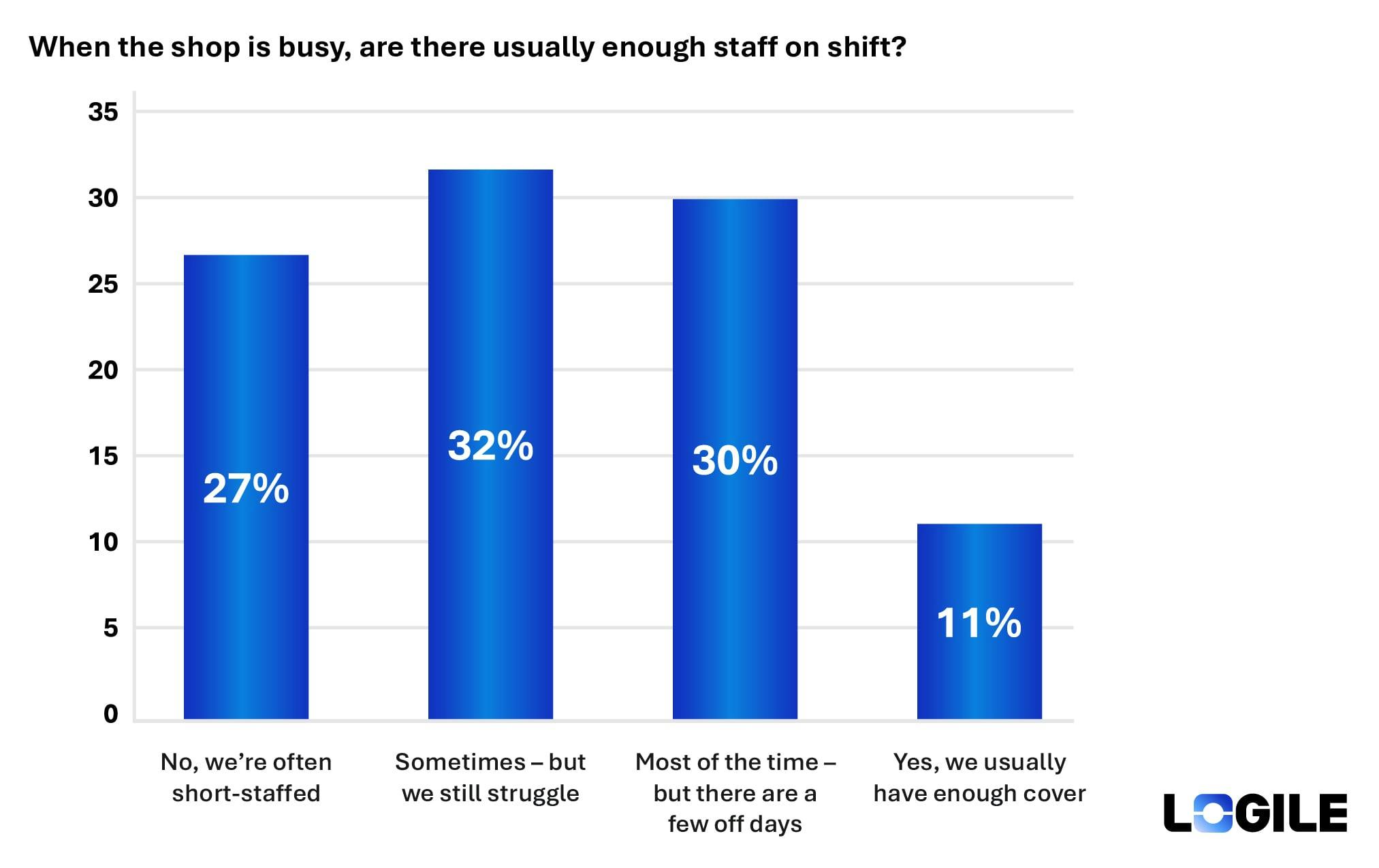
This is not simply a question of adding or cutting hours. The challenge is one of alignment—matching staff levels to real demand and work requirements in real time. When coverage misses both ways, retailers lose twice: once in service and sales, and again in efficiency. Smarter rota execution is needed to put every scheduled hour to work.
The Human Cost of Poor Rota Planning
For colleagues, rota volatility is not just an operational frustration—it is a source of daily stress. Even when rotas are posted in advance, last-minute changes, short-staffing and unbalanced coverage disrupt both work and personal life. The cost is felt in energy, morale and retention.
The numbers show how widespread the strain has become. 87% of staff face last-minute rota changes, despite 72% receiving their rota at least a week in advance. 88% report feeling overwhelmed at least occasionally due to poor staffing, while 53% say last-minute changes disrupt personal plans. For more than a third of colleagues, these changes have meant missing an important personal event.
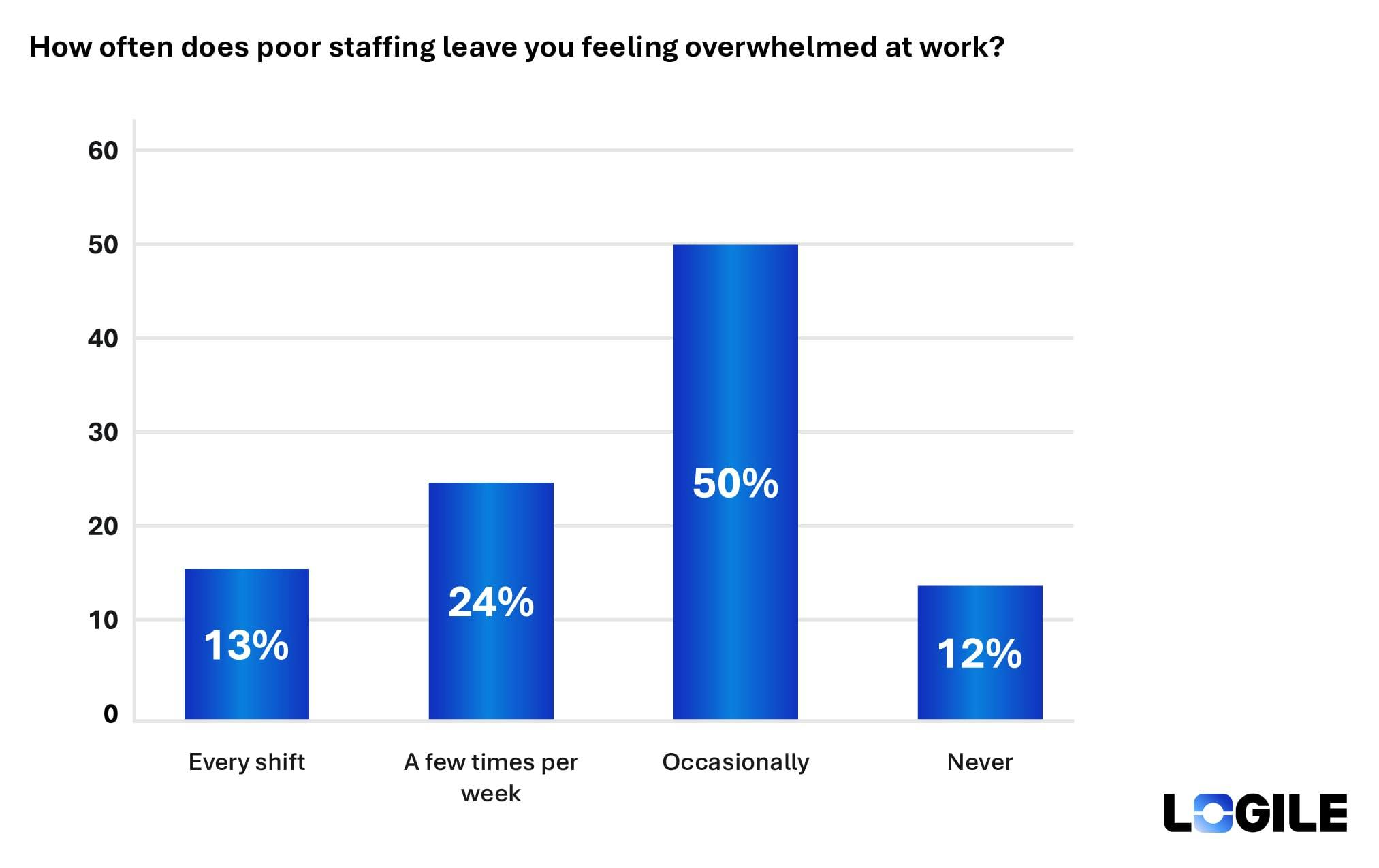
These pressures ripple through the shop floor. Colleagues are frequently asked to stay late or pulled away from their usual roles to cover gaps. The effect is a workforce spread thin, often firefighting rather than delivering consistent service. Addressing the human cost is not just about wellbeing—it is essential to stabilising teams and sustaining performance.
Predictability Drives Retention
In today’s retail environment, keeping experienced staff is as important as recruiting them. Pay matters, but colleagues make it clear that schedule stability is a make-or-break factor in their decision to stay. When rotas are unpredictable, frustration builds and turnover risk rises.
The survey findings underline this point. 61% of colleagues say they would be more likely to stay if their rota were more predictable. Yet many are already considering leaving: 62% have thought about quitting or might if rotas and hours do not improve, and 72% report seeing colleagues leave due to scheduling or hours. These are not isolated cases—they represent a broad retention challenge linked directly to rota execution.
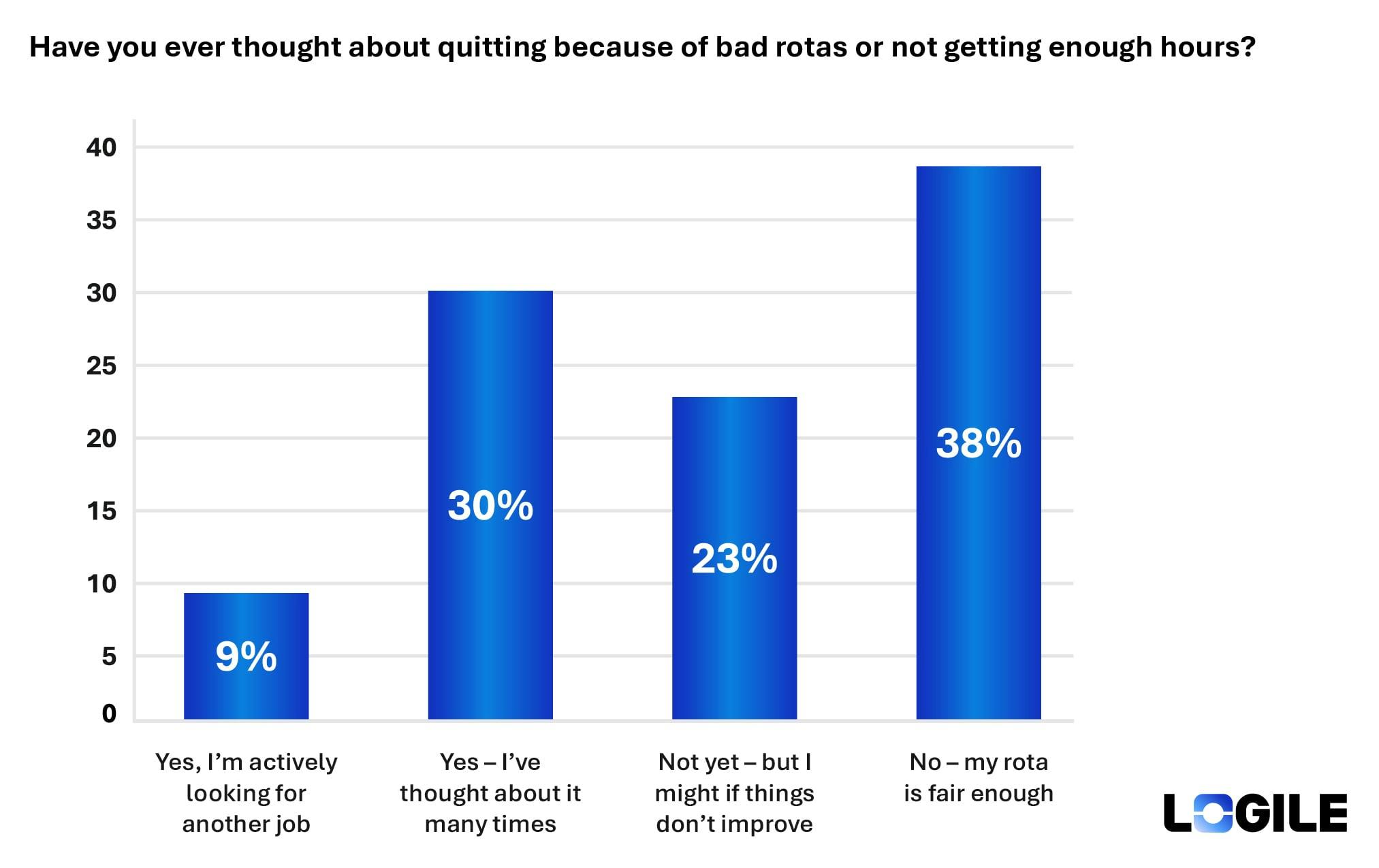
For retailers, improving predictability is not just about compliance or fairness. It is a strategic lever for holding onto talent in a competitive labour market. Better alignment of rotas with real availability and demand can reduce churn, stabilise teams and deliver a more consistent customer experience.
Frontline Is Open to AI
While rota execution is a persistent challenge, colleagues are not opposed to new tools that could help fix it. In fact, the research suggests frontline staff are ready to embrace automation—provided it delivers accurate, fair and manager-supported schedules.
The survey shows that 60% of colleagues would trust or maybe trust demand-led rotas with manager oversight. When asked about the benefits, 28% said better customer service would be the top improvement and another 28% pointed to smoother shop operations. Colleagues see demand-driven scheduling not as a threat, but as a way to reduce stress, improve service and make daily operations more predictable.
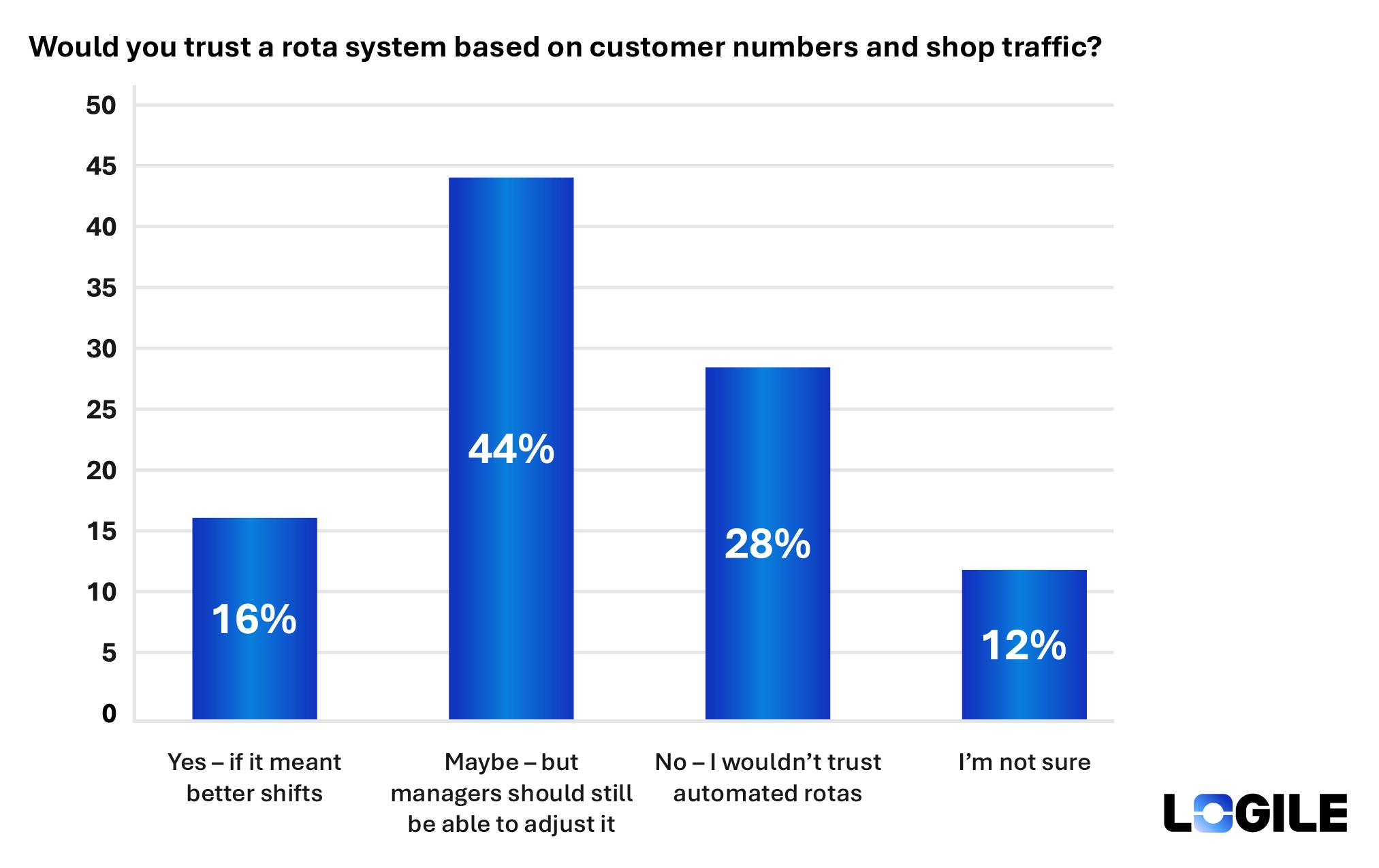
For retailers, this presents an opportunity. By combining accurate forecasting with AI-driven scheduling and human oversight, labour plans can better match real demand and earn buy-in from the teams who live with them day to day. Trust will be built not through promises, but through consistent delivery of rotas that work in practice as well as on paper.
Conclusion: Closing the Execution Gap
The evidence from UK colleagues is clear. Labour plans that look fine on paper often break down in practice, leaving shops short-staffed at peak times, overstaffed when quiet, and staff stretched in between. The consequences are felt in lost sales, reduced service quality, rising stress and growing turnover risk.
But the solution is also clear. By closing the execution gap—through better forecasting, smarter labour modelling, demand-led scheduling and real-time adjustments—retailers can put every scheduled hour to work. Colleagues can see first-hand how poor alignment costs sales and service, and they are open to solutions that deliver accuracy and trust. Retailers that connect demand forecasting, labour modelling and execution in one continuous flow will not only meet rising expectations for fairness at work, but also unlock measurable gains in efficiency, retention and customer experience.

Logile’s AI-driven Connected Workforce platform is designed to support exactly this shift. It enables retailers to forecast demand with greater precision, model staffing needs down to the unique store and department level, and generate optimised rotas that reflect both operational goals and the real-world constraints, preferences and availability of the frontline. With smarter tools enabling the highest accuracy and actionable insights, Logile helps retailers move from reactive scheduling to proactive, predictive workforce management.
“The UK retail reality reflected in our data shows that rota predictability is not just a fairness issue; it is a performance issue,” said Purna Mishra, Founder and CEO of Logile. “Colleagues can see first-hand
how poor alignment costs sales and service, and they are open to solutions that deliver accuracy and trust. Retailers that connect demand forecasting, labour modelling and execution in one continuous flow will not only meet rising expectations for fairness at work, but also unlock measurable gains in efficiency, retention and customer experience.”
UK retail is facing both cost pressure and rising expectations for fairness at work. Those who connect planning with execution will be best placed to deliver not only compliance, but stronger service, higher retention and a healthier bottom line. The path forward is not more planning—it is better execution.

Download the Full Report
Logile is the leading retail operations platform provider, delivering intelligent, AI-powered solutions for forecasting, labor planning, workforce management, inventory, food safety and store execution. Retailers worldwide rely on Logile to optimize performance, reduce costs, and empower confident stores.
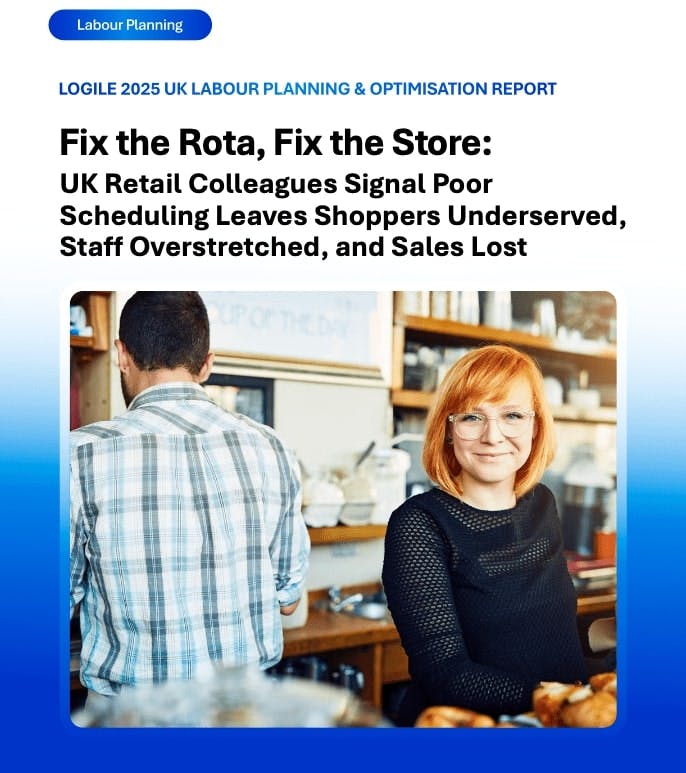
Recent Posts
How Technology Enables Retailers to Invest in Community-Centric In-Store Experiences
2026-01-05
Community programs need operational precision to succeed. See how Lowes Foods' Community Table thrives with AI-driven labor planning that creates capacity for connection.
Read More
NRF 2026 Guide: Top Trends Shaping the Future of Retail and What to Expect From Logile
2025-12-15
Logile celebrates 20 years at NRF 2026 with AI-powered workforce solutions. Visit Booth #4849 & #1503 to see how connected operations drive retail success.
Read More
UK Retail Budget 2025: What Retailers Need to Respond to Now
2025-12-02
The 2025 UK Budget is reshaping retail economics. Rising labour costs, higher rates, tighter margins—here's what retail leaders must prioritize now.
Read More


